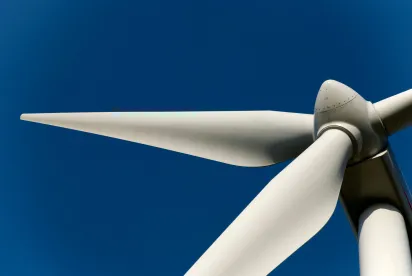On July 27, 2023, Maine Governor Janet Mills signed into law An Act Regarding the Procurement of Energy from Offshore Wind Resources. The Act calls for the responsible development of three gigawatts of offshore wind power in federal waters in the Gulf of Maine by 2040.
Specifically, the Act establishes an Offshore Wind Research Consortium and an Offshore Wind Renewable Energy & Economic Development Program, sets guidelines for offshore wind energy procurement, and plans for the establishment of regional transmission solutions. These plans are in place to support the state’s goal of 80% renewable energy by 2030.
Offshore Wind Consortium and Economic Development Program
The Governor’s Energy Office, the Department of Marine Resources, and the Department of Inland Fisheries and Wildlife will coordinate research through the Offshore Wind Research Consortium. The goal of the Consortium is to research opportunities and challenges associated with the development of floating offshore wind projects and develop methods to minimize impacts to the ecosystem and existing ocean users.
An advisory board will oversee the Consortium and will be comprised of members representing the state’s commercial lobstering and fishing industries, recreational charter fishing industry, federally recognized Indian tribes, marine wildlife and habitats, and offshore wind developers. The advisory board will also include representatives appointed by the Department of Marine Resources and the Department of Inland Fisheries and Wildlife. All approved offshore wind projects must contribute $5,000 per megawatt to fund the Consortium.
The Act also establishes the Maine Offshore Wind Renewable Energy and Economic Development Program. The Governor’s Energy Office and the Public Utilities Commission (PUC) will administer the Program to further the state’s climate policies, renewable energy goals, and workforce development goals while promoting offshore wind development and transmission infrastructure.
Solicitation Planning
The Act directs the PUC to request proposals for projects of at least 600 megawatt capacity by the later of January 15, 2026, or three months after the first Gulf of Maine lease auction. The Commission must prioritize offshore wind projects that provide employment benefits to disadvantaged communities, contribute financially to research activities, produce economic benefits to the state, maximize resident hiring, and provide ratepayer benefits.
Transmission Goals
The Act also directs the PUC to conduct and approve solicitations for offshore wind energy transmission projects. The Commission will seek to advance regional transmission solutions and consider proposals that upgrade the existing grid, extend the grid closer to the offshore wind projects, develop landfall cable approaches, or interconnect offshore substations.
Notable Features
A notable feature of the Act is the state’s promotion of fisheries engagement and investment. At least six members of the Consortium’s advisory board will represent commercial and recreational fishing interests. The Act also stipulates that all proposals submitted by a developer must include a Fishing Communities Investment Plan. This plan requires developers to make annual investments in fishing communities, including establishing grant programs to support fishing-related businesses.
This is notable because although most states, such as Massachusetts, Rhode Island, New York, and New Jersey require developers to submit some form of a Fisheries Mitigation Plan, no existing procurement solicitations have required developers to invest annually into fishing communities. In addition, the Commission must prioritize awarding projects that are located outside of Lobster Management Area I, an area in the Gulf of Maine spanning the Canadian border to Cape Cod.
A second feature of the Act is the state’s commitment to viewshed impact minimization and mitigation. To limit disruption to the scenic character of the state, the Maine Department of Environmental Protection can only approve permits for up to four offshore wind terminal permits (defined as port facilities and upland areas for the fabrication, assembly, storage and launching of offshore wind turbines, foundations, generators, and other components), and the Act requires that all projects must minimize their adverse impacts to the scenic character of the area to the maximum extent practicable.
A third feature is the adoption of community and workforce enhancement standards. Under these standards, contractors and subcontractors engaged in offshore wind construction activities are required to prioritize hiring members of the affected communities and Maine residents, thereby creating opportunities for Maine workers to participate in this emerging industry.
The Act also requires the use of hiring halls to address workforce needs. All workers must be compensated at or above the Maine emerging industry compensation threshold, and the Act creates a penalty for contractors who pay their workers less than the minimum pay grade. These requirements are notable because Governor Mills previously vetoed an earlier version of the bill due to concerns that non-unionized Maine workers would be excluded from offshore wind-related work.
This Act sets forth coordinated steps to facilitate the development of offshore wind power in Maine and requires developers to engage and invest in the state’s local communities.




 />i
/>i
